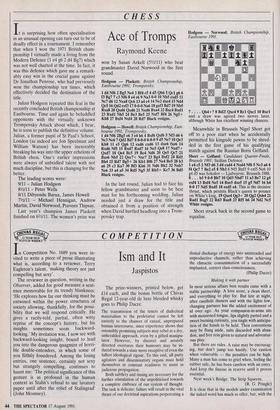CHESS
Ace of Tromps
Raymond Keene
It is surprising how often specialisation in an unusual opening can turn out to be of deadly effect in a tournament. I remember that when I won the 1971 British cham- pionship I virtually made a living from the Modern Defence (1 e4 g6 2 d4 Bg7) which was not well charted at the time. In fact, it was this defence which gave me a remark- ably easy win in the crucial game against Dr Jonathan Penrose, who had previously won the championship ten times, which effectively decided the destination of the title.
Julian Hodgson repeated this feat in the recently concluded British championship at Eastbourne. Time and again he befuddled opponents with the virtually unknown Trompovsky Attack about which, I hear, he is soon to publish the definitive volume. Julian, a former pupil of St Paul's School, London (as indeed are Jon Speelrnan and William Watson) has been inexorably breaking his way into the upper echelons of British chess. One's earlier impressions were always of unbridled talent with not much discipline, but this is changing for the better.
The leading scores were: 9/11 — Julian Hodgson
81/2/11 — Peter Wells
8/11 Dibyendu Barna, James Howell 71/2/11 — Michael Hennigan, Andrew
Martin, David Norwood, Praveen Thipsay. Last year's champion James Plaskett
finished on 61/2/11. The women's prize was won by Susan Arkell (51/2/11) who beat grandmaster David Norwood in the first round.
Hodgson — Plaskett: British Championship, Eastbourne 1991; Trompovsky.
1 d4 Nf6 2 Bg5 Ne4 3 Ilf4 c5 4 d5 Qb6 5 Qcl g6 6 f3 Bg7 7 c3 Nf6 8 e4 e6 9 No3 0-0 10 Nb5 exd5 11 Nc7 d6 12 Nxa8 Qc6 13 a4 c4 14 Ne2 dxe4 15 Nd4 Qc5 16 Qd2 exf3 170-0.0 Na6 18 gxf3 Bd7 19 Nb5 Rxa8 20 Qxd6 Qxd6 21 Nxd6 Bxa4 22 Bxc4 Bxdl 23 Rxdl Nh5 24 Be3 Be5 25 Nx17 Bf4 26 Ng5+ 27 Bxf4 Nxf4 28 Rd7 Black resigns.
Hodgson —Howell: British Championship, East- bourne 1991; Trompovsky. 1 d4 Nf6 2Bg5 e6 3 e4 h6 4 Bxf6 Qxf6 5 NO d6 6 Nc3 Nc6 7 Qd2 Bd7 8 0-0-0 0-0-0 9 d5 Ne7 10 Qe3 Kb8 11 e5 Qg6 12 exd6 cxd6 13 dxe6 fxe6 14 Rxd6 Nf5 15 Rxd7 Rxd7 16 Ne5 Qe8 17 Nxd7+ Qxd7 18 Qe4 Bc5 19 Bc4 Nd6 20 Qe5 Qc7 .21 Bxe6 Nb5 22 Qxc7+ Nxc7 23 Bg4 Bxf2 24 Rdl Bh4 25 Rd7 Bg5+ 26 Kb1 Bf6 27 Ne4 Be5 28 h3 a6 29 c3 Ka7 30 Bf3 Kb6 31 Nd6 Bh2 32 Nxb7 Ne6 33 a4 a5 34 Rd5 Ng5 35 Rb5+ Kc7 36 Bd5 Black resigns.
In the last round, Julian had to face his fellow grandmaster and soon to be best man for his forthcoming wedding. Julian needed just a draw for the title and obtained it from a position of strength when David hurtled headlong into a Trom- povsky trap.
Hodgson — Norwood: British Championship, Eastbourne 1991.
7. . . Qb4+? 8 Bd2! Qxc4 9 Rd l Qxcl 10 Bxcl and a draw was agreed two moves later, although White has excellent winning chances.
Meanwhile in Brussels Nigel Short got off to a poor start when he accidentally permitted his kingside pawns to be shred- ded in the first game of his qualifying match against the Russian Boris Gelfand. Short — Gelfand: Candidates Quarter-Finals, Brussels 1991; Sicilian Defence.
1 e4 c5 2 Nf3 d6 3 d4 cxd4 4 Nxd4 Nf6 5 Nc3 a6 6 f4 Qc7 7 Be2 e5 8 Nb3 8 Nf5 Bxf5 9 exf5 Nc6 10 g4 d5 was Sokolov — Ljubojevic. Brussels 1988. 8 . . . 135 9 0-0 Bb7 10 Qd3 Nbd7 11 a3 Be7 12 g4 exf4 13 Bxf4 Ne5 14 Bxe5 dxe5 15 g5 Nd7 16 h4 0-0 17 Nd5 Bxd5 18 exd5 e4. This is the decisive thrust, which permits Black's queen to pounce on White's king. 19 Qxe4 Qg3+ 20 Qg2 Qxh4 21 Radl Bxg5 22 Rd3 Rae8 23 Rf5 h6 24 Nd2 NcS White resigns.
Short struck back in the second game to equalise.


















































 Previous page
Previous page